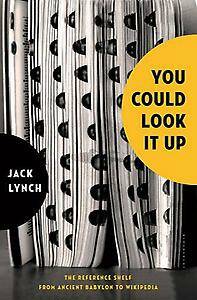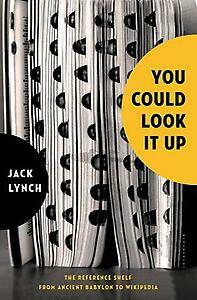
Bedankt voor het vertrouwen het afgelopen jaar! Om jou te bedanken bieden we GRATIS verzending (in België) aan op alles gedurende de hele maand januari.
- Afhalen na 1 uur in een winkel met voorraad
- In januari gratis thuislevering in België
- Ruim aanbod met 7 miljoen producten
Bedankt voor het vertrouwen het afgelopen jaar! Om jou te bedanken bieden we GRATIS verzending (in België) aan op alles gedurende de hele maand januari.
- Afhalen na 1 uur in een winkel met voorraad
- In januari gratis thuislevering in België
- Ruim aanbod met 7 miljoen producten
Zoeken
You Could Look It Up
The Reference Shelf From Ancient Babylon to Wikipedia
Jack Lynch
Hardcover | Engels
€ 41,95
+ 83 punten
Omschrijving
"Knowledge is of two kinds," said Samuel Johnson in 1775. "We know a subject ourselves, or we know where we can find information upon it." Today we think of Wikipedia as the source of all information, the ultimate reference. Yet it is just the latest in a long line of aggregated knowledge--reference works that have shaped the way we've seen the world for centuries.
You Could Look It Up chronicles the captivating stories behind these great works and their contents, and the way they have influenced each other. From The Code of Hammurabi, the earliest known compendium of laws in ancient Babylon almost two millennia before Christ to Pliny's Natural History; from the 11th-century Domesday Book recording land holdings in England to Abraham Ortelius's first atlas of the world; from Samuel Johnson's A Dictionary of the English Language to The Whole Earth Catalog to Google, Jack Lynch illuminates the human stories and accomplishment behind each, as well as its enduring impact on civilization. In the process, he offers new insight into the value of knowledge.
You Could Look It Up chronicles the captivating stories behind these great works and their contents, and the way they have influenced each other. From The Code of Hammurabi, the earliest known compendium of laws in ancient Babylon almost two millennia before Christ to Pliny's Natural History; from the 11th-century Domesday Book recording land holdings in England to Abraham Ortelius's first atlas of the world; from Samuel Johnson's A Dictionary of the English Language to The Whole Earth Catalog to Google, Jack Lynch illuminates the human stories and accomplishment behind each, as well as its enduring impact on civilization. In the process, he offers new insight into the value of knowledge.
Specificaties
Betrokkenen
- Auteur(s):
- Uitgeverij:
Inhoud
- Aantal bladzijden:
- 320
- Taal:
- Engels
Eigenschappen
- Productcode (EAN):
- 9780802777522
- Verschijningsdatum:
- 5/04/2016
- Uitvoering:
- Hardcover
- Afmetingen:
- 166 mm x 242 mm
- Gewicht:
- 850 g

Alleen bij Standaard Boekhandel
+ 83 punten op je klantenkaart van Standaard Boekhandel
Beoordelingen
We publiceren alleen reviews die voldoen aan de voorwaarden voor reviews. Bekijk onze voorwaarden voor reviews.









